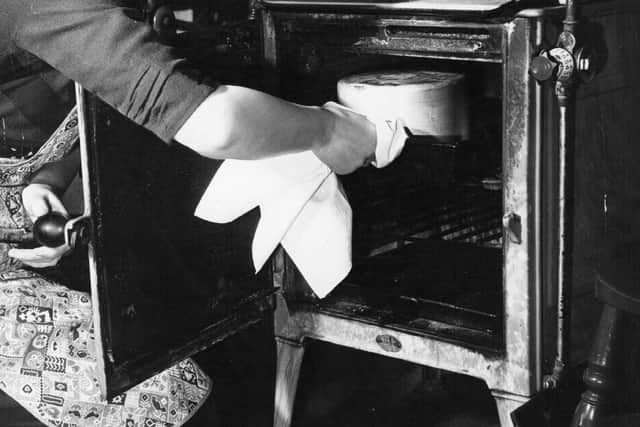A woman's work was never done in 1950s, says Retro columnist Monica Dyson
and live on Freeview channel 276
My father’s generation did little or no housework. The true 50s male had a role as ‘head of the household’ and as such was in complete charge of things like legal documents and bank accounts.
Women did not actually have any sort of financial dealings other than the family allowance which was paid directly to her, and the housekeeping money which father kept a strict eye on in case she overspent!
Advertisement
Hide AdAdvertisement
Hide AdShe did not have any money that she had earned herself as it was rare that women then had any sort of paid occupation. In fact, the census up to fairly recent times listed women’s occupations as ‘unpaid domestic workers’.


Popular magazines like Woman’s Own became a woman’s bible and guide to all things to do with the home, beauty, fashion and with relationships. They encouraged women to stay at home and be the perfect Stepford wife, certainly after the war had finished, so that men could easily return to the jobs they had held before.
Popular adverts of the 50s showed the Oxo wife, Katy, wearing a pretty frilled apron, the perfect wife and mother smiling in pride as she places a casserole on the table to serve to her beautifully-behaved children and appreciative husband.
Men were not cruel or uncaring or particularly domineering. It was just that male and female roles were clearly defined then and you did not cross the line.
Advertisement
Hide AdAdvertisement
Hide AdMother had dinner on the table for when father returned home from work after a day she’d spent cleaning, washing, ironing, shopping and childcare, to include taking them to and from school.
It may have been thought that women had plenty of leisure time but their days were long and the work laborious.
Shopping, in the absence of fridges or freezers was something to be done daily and involved visiting numerous different kinds of shops. The old-style corner shop was always busy and everything was conducted in cash there and then unless you were able to take advantage of a weekly account, often called ‘tick’ or ‘strap’.
Shopping wasn’t something the man of the household bothered himself with. The exceptions were the purchases of expensive items like carpets, three-piece suites and later labour-saving electrical equipment as befitted the newly-affluent society of the 50s.
Advertisement
Hide AdAdvertisement
Hide AdPrime Minister Harold Macmillan had told the nation that ‘We had never had it so good’ and so people didn’t want to think their neighbours were doing better than they were, even though goods were mostly bought by hire purchase agreements called unofficially ‘ the never never’! Husbands needed to be there for these purchases as his signature had to appear on the documents!
In 1948 few households had a washing machine. The housewife had to heat water in a copper, wash by hand and wring out using a mangle. It was physically tiring and time consuming.
Even by 1971 still only 64 per cent of households had a washing machine and in the 60s and 70s many women took the weekly wash to the local laundrette. To many men, the mechanics of washing machines, irons and cookers remained a mystery for much of their lives.
Even when I was at grammar school women were prepared for their lives of the future, which did not very often involve anything like university places. At best, you could hope for a place at a commercial college which would equip you for an occupation as a shorthand typist.
Advertisement
Hide AdAdvertisement
Hide AdIncluded in our syllabus was domestic science which included cookery and dressmaking, whilst I’m sure that the male version of the school I attended included woodwork and mechanics.
At primary school we had read from the Janet and John series which we didn’t know at the time but were incredibly sexist. Janet helped mummy round the house with dusting, cleaning, and cooking, whilst John helped daddy with the masculine things like gardening and washing the car.
We knew few people who had a car but the boys were prepared in case their father ever acquired one. The thought that their mother might was not even an option!
It was not surprising then that many men of our father’s generation were clueless about most kinds of household tasks and in fact my father-in-law could barely stir a cup of tea.
Advertisement
Hide AdAdvertisement
Hide AdAs a Navy veteran of the last war it wasn’t that he couldn’t do anything, it was just that men were not expected to, so he didn’t bother!
However things have changed or so we thought, so the revelation that Tony Blair hadn’t cooked a meal, done a weekly shop or any form of housework since he took office as Prime Minister in 1997 came as a bit of a shock.
It seems that he found it difficult to resume any form of normality after his years in Number 10, where there is a staff of servants, and once living as a ‘normal’ person in his seven-bedroom house was happy to leave all household matters to his wife Cherie and their children!
I have to say that this is not particularly representative of men today. Especially of our children’s generation, when men like my own son do play an equal part in their relationship.
Advertisement
Hide AdAdvertisement
Hide AdHowever, it is still not always the case and many young women who try to juggle housework and childcare with the demands of a busy job may well have sometimes wondered if this is the liberation women have fought so hard for!
In these confusing and worrying times, local journalism is more vital than ever. Thanks to everyone who helps us ask the questions that matter by taking out a digital subscription or buying a paper. We stand together. Nancy Fielder, editor.